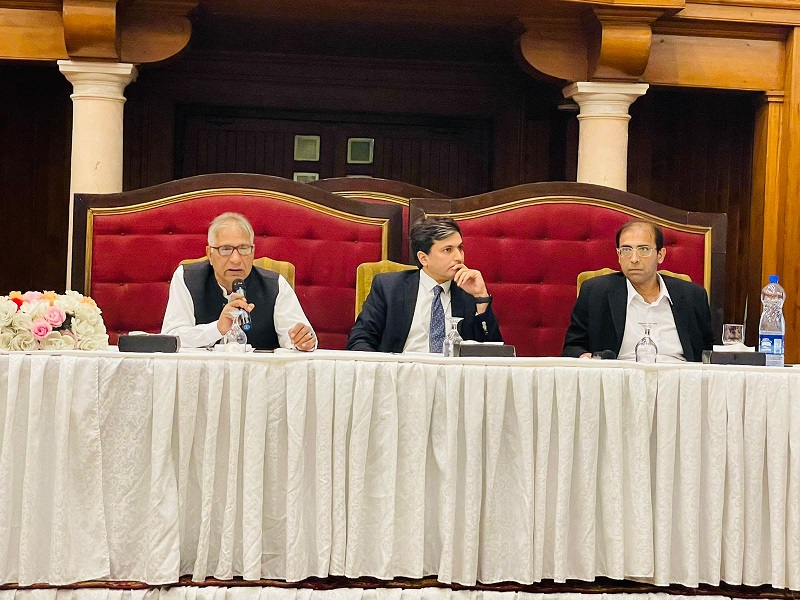LAHORE, Pakistan: The Centre for Social Justice (CSJ) organized a briefing in Lahore on Wednesday to commemorate the 10th anniversary of the landmark judgment on minorities’ rights (SMC No. 1/2014) authored by the former Chief Justice Tassaduq Hussian Jillani.
The speakers included the Executive Director at CSJ Peter Jacob, Saroop Ijaz Advocate, and Saqib Jillani Advocate while Naina Samson was the master of ceremony.
The briefing was attended by lawyers, journalists, and human rights defenders, wherein the speakers raised their serious concerns over the lack of seriousness on the part of the federal and provincial governments to address human rights violations, and called upon the government to take concrete measures to protect religious freedom and minorities’ rights in accordance with the directions of the Judgment on minorities rights.
Speaking on the occasion, Peter Jacob expressed deep resentment over the persistent non-compliance with the Supreme Court Judgment on minorities’ rights, citing systemic weaknesses at all tiers of governance and the lack of progress made by federal and provincial government institutions over the past decade.
Peter Jacob said that the executive’s continued failure to develop a curriculum in line with Article 22(1) of the Constitution of Pakistan, along with its half-hearted attempts to establish a national commission for minorities’ rights in conformity with the UN Paris Principles on national human rights institutions, amounts to contempt of court.
The CSJ executive director urged the government to make serious efforts to address the dysfunction within implementing bodies, and emphasized the need for a manifested will and commitment to fully comply with court orders, to protect minorities’ rights, and to address the broader challenges hindering the country’s democratic development.
Peter Jacob noted that the Supreme Court’s implementation bench has not conducted a hearing for over a year and a half.
Therefore, he called for the reconstitution of the implementation bench to resume regular proceedings and urged the court to consider empowering the One-man Commission with contempt powers, which would significantly enhance the effectiveness of the commission and improve the implementation of the judgment.
The Advocate Supreme Court Saqib Jillani stressed the need for coordinated efforts across all branches of government including the executive, parliament, and judiciary as well as all other state institutions, to implement the constitutional promise of equality and non-discrimination for all citizens of Pakistan.
Saqib Jillani emphasized that the Supreme Court needs to adopt a more proactive role in ensuring the enforcement of its directives in the judgment of 2014 regarding minorities’ rights. He expressed the need for all tiers of courts in Pakistan, including High Courts and trial courts to approach cases involving minorities and other vulnerable groups with greater empathy and compassion. An empathetic approach to justice will lead to a significant and transformative improvement in the quality of justice in Pakistan.
Saroop Ijaz Advocate stated that the findings and directives of the judgment had the potential of reforms and scope to contribute to advancing religious freedom, and building a tolerant society. Unfortunately, the federal and provincial governments failed to capitalize on this verdict to realize the equality of rights and respect for diversity in Pakistan. He said that the lack of compliance with this judgment is due to a lack of capacity and political will among government stakeholders.
Saroop Ijaz underlined that it is the government’s responsibility to implement court directives, therefore, the government must give attention to the recommendations for effective implementation at both provincial and federal government levels to protect the minorities’ rights in the light of the judgment, and consider bringing the matter of non-compliance to the political agenda, particularly in cabinet and standing committees.
The CSJ’s assessment report “A Decade of Non-Compliance” was launched which assessed the level of compliance with the Supreme Court verdict on minorities’ rights.
The report revealed that none of the original seven directions issued by the Supreme Court of Pakistan were fully complied with by either the federal or provincial governments despite the implementation Bench of the Supreme Court conducted 34 hearings, and issued a total of 89 supplementary directions over the last decade.
The report revealed that the Sindh government achieved the highest compliance score with 9 out of 25, followed by the Punjab government with an 8/25 score. Balochistan and Khyber Pakhtunkhwa governments achieved implementation scores of 6/25 and 5/25 respectively. The federal government had the lowest compliance score, reflecting stalled progress in adhering to court directions.
